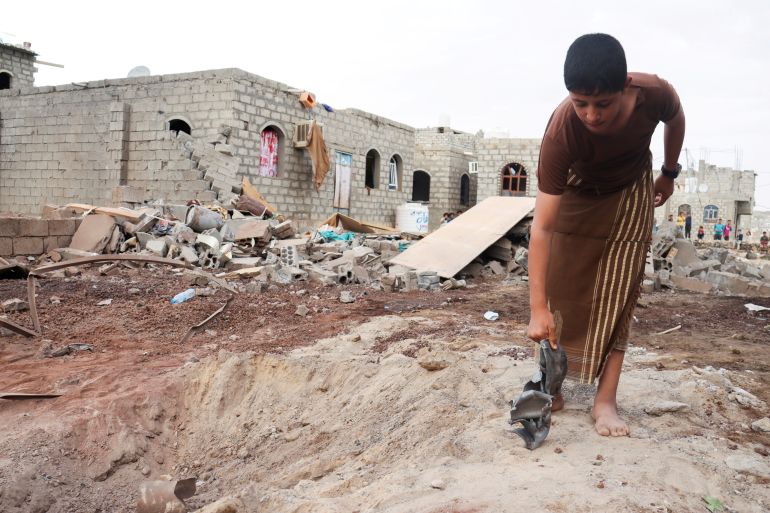War-weary Yemenis greet Saudi-Iran deal with caution
Riyadh and Tehran may have moved to bury some of their differences, but it is unclear whether the same will happen in Yemen.

Sanaa, Yemen – Like thousands of Yemeni parents, Ali Mohammed has lost children fighting in the country’s long-running war.
But in his case, one son, Fahd, died in 2018 fighting for the Saudi-backed Yemeni government, while the other, Nashwan, died the following year fighting for their enemies, the Iran-aligned Houthi rebels.
Keep reading
list of 4 itemsUS sanctions shipping firm accused of links to Iran, Yemen’s Houthis
Vessel struck in Red Sea as Houthis promise attacks on more shipping lanes
What we know about deadly Houthi attack on cargo ship
Now, Saudi Arabia and Iran have agreed to restore diplomatic ties after years of tensions, leaving Yemenis like Mohammed surprised – and confused.
“Today, they are ready to be friends, offer concessions to meet their interests, while our country is awash with ordeals,” said Mohammed, a resident of the capital, Sanaa, which has been under Houthi control since 2014.
The Chinese-brokered rapprochement announced by Saudi Arabia and Iran last week in Beijing came after several rounds of talks, including in Iraq and Oman.
It will lead to the reopening of their respective embassies within two months and the activation of a security cooperation arrangement, with the two regional powerhouses pledging to respect state sovereignty and not interfere in each other’s internal affairs.
But while Riyadh and Tehran may have moved to bury some of their differences, it is unclear whether the same will happen in war-scarred Yemen.
Saudi Arabia has led a military intervention in Yemen since 2015 in support of the internationally recognised government fighting the Houthis. Iran, meanwhile, has said it supports the rebels politically but denies sending them weapons, as alleged by Saudi Arabia and others. The Houthis in recent years have targeted a number of oil facilities and airports in Saudi Arabia and its coalition partner, the United Arab Emirates.
On Monday, the Yemeni government and the Houthis announced that they had agreed upon a prisoner swap that would also include the release of 15 captured Saudis. It was not immediately clear whether the timing of the announcement was coincidental or not, but questions remained over any other confidence-building measures on the back of the Beijing deal.
Adel Dashela, a Yemeni political researcher and author, said he did not believe the Saudi-Iran normalisation would turn Yemen into a stable country overnight.
“I do not think the Saudi-Iran agreement will largely affect the Yemeni file,” Dashela told Al Jazeera. “It is not easy to end the Houthi takeover of Sanaa, retrieve the state weapons they seized and force them to abandon the use of weapons.”
Commenting on the potential motives for reaching an agreement, he pointed to Saudi Arabia’s security needs and Iran’s “internal crises” and the impact of the sanctions imposed by the United States.
“That is why the two sides agreed to make concessions and resume relations.”
‘Obedient forces’
The war in Yemen has killed hundreds of thousands of people, displaced millions and caused the world’s worst humanitarian crisis, according to the United Nations. More than 23.4 million people, or three-quarters of Yemen’s population, require assistance, including 2.2 million youngsters who are acutely malnourished.
Abdulrahman, a 53-year-old retired military officer in Sanaa, said the Saudi-Iran deal reminded Yemenis that their country’s plight is due to the lack of united leadership.
“Should the country have seasoned and wise political leaders, we would not plummet into this chaos in the first place and let foreign powers control our fate,” said Abdulrahman, who did not want to give his full name.
He said the massive casualty figures after years of fighting have exacerbated the warring sides’ animosity.
“The Yemeni proxies have been willing to commit to their regional backers’ instructions in pursuit of military and political victories. That is why our country has been a hub of humanitarian suffering.”
Meanwhile, both the Houthis and the Yemeni government welcomed the Riyadh-Tehran detente, expressing their desire for peace.
“The region needs the resumption of normal ties between its countries,” said the Houthis’ chief negotiator, Mohammed Abdulsalam.
Likewise, the government said it always has faith in dialogue and diplomatic approaches for resolving disputes. In its statement, the government hoped that the Saudi-Iran deal would form a new regional relationship phase.
For Abdulrahman, such statements did not come as a surprise.
“They [Houthis and the government] are obedient forces, unopposed to the Saudi and Iranian initiatives and plans.”
He said it was normal for a country to forge alliances in its region and beyond, but added that “these relations should not render our country servile to any foreign power.”
“That is what Yemen’s elites failed to do,” Abdulrahman said.
Mohammed, meanwhile, said he felt Yemen had been betrayed.
“They have put Yemen on fire for seven years in pursuit of their conflicting agenda,” said the grieving father. “Today, they begin a new chapter of cooperation and partnership. So, what were they fighting for in Yemen?”